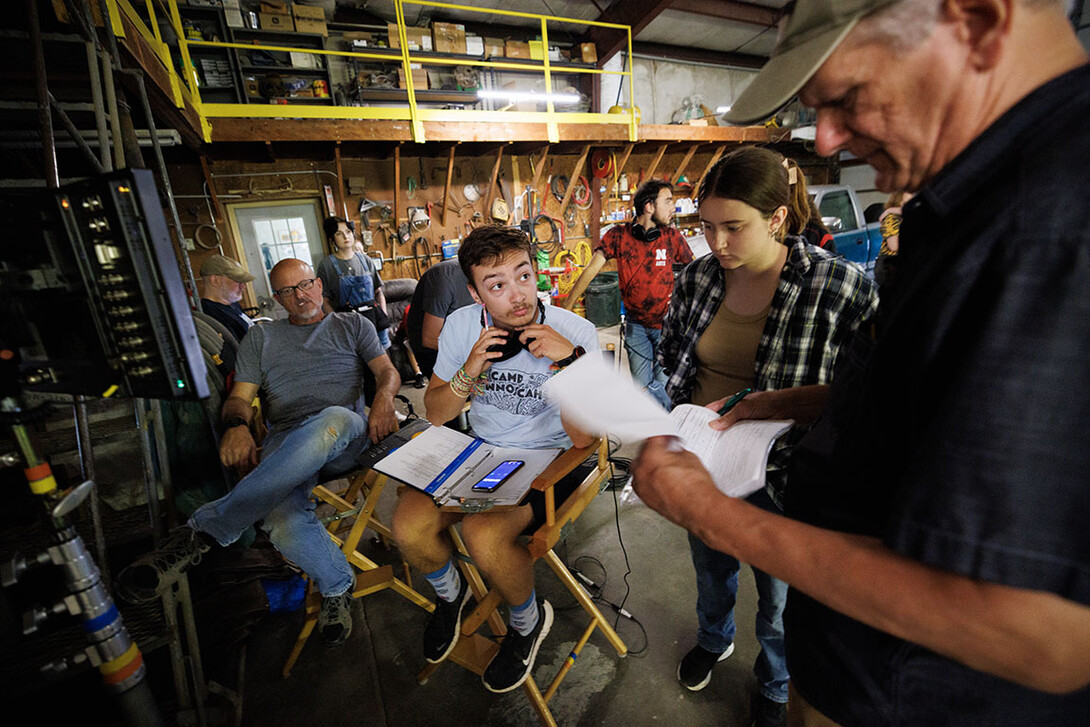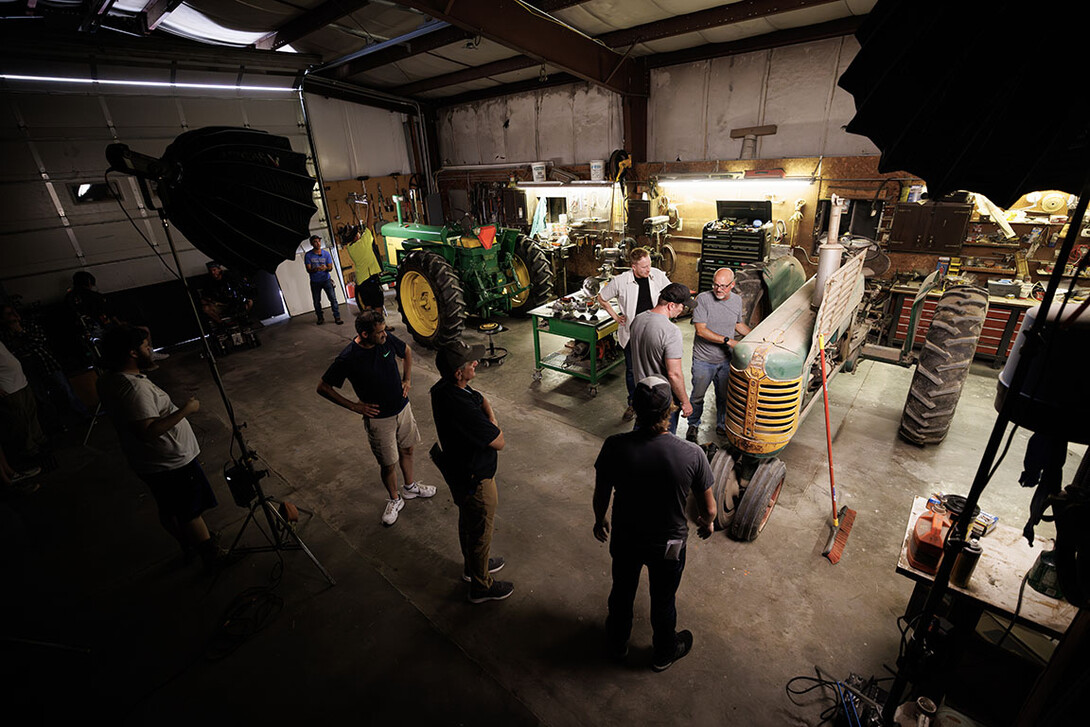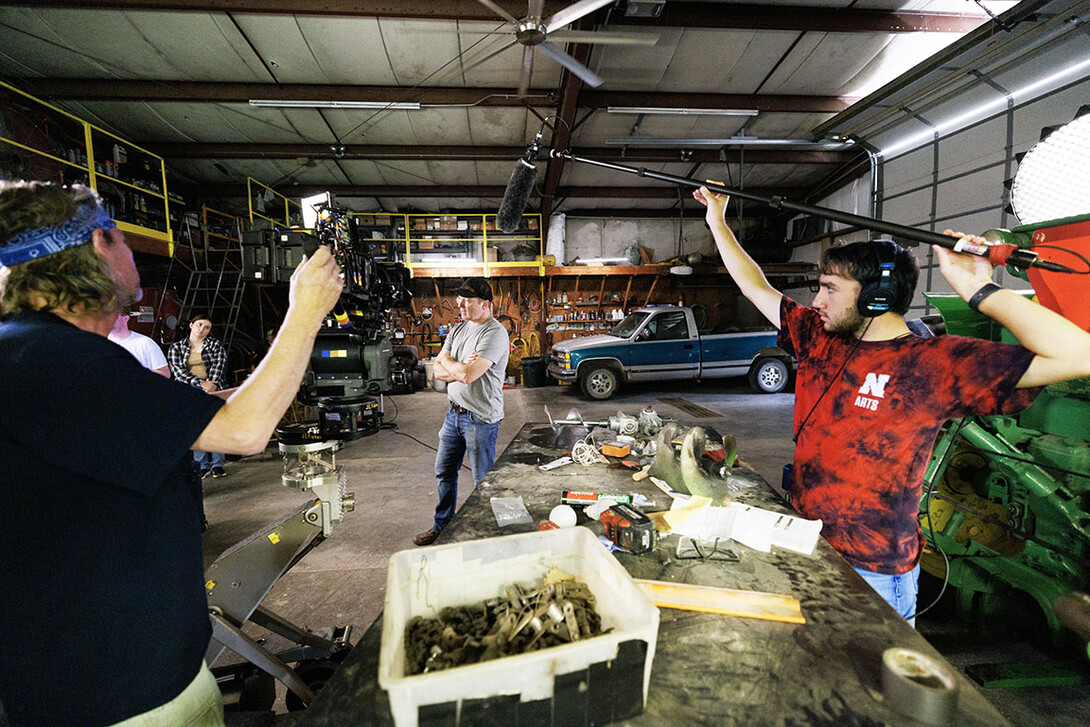
Bright lights entered small town Nebraska for a project led by a team from the University of Nebraska–Lincoln.

“I think our students do understand that at the core of everything they do, what they’re doing is contributing as part of a larger team to a singular creative vision,” Endacott said.
Endacott’s screenplay for the roughly 15-minute short film tells the story of two estranged brothers who come together to restore an antique tractor after the death of the father. Endacott entered the script, titled "Turn Over," into several screenwriting competitions, winning three of them. He received grants from the Office of Research and Economic Development, the Hixson-Lied College of Fine and Performing Arts and the Johnny Carson Center for Emerging Media Arts for production.
Inspired by projects he’d worked on in the past, Endacott knew from the beginning he wanted to pull students into the fold. Inviting some students to join the crew was a natural choice for Endacott.
“I want them engaged,” he said. “I don’t have any hesitation at all.”
Over four days in August, on a farm near Manley, Nebraska, the students worked in the camera, lighting and sound departments among others. Charlie Major, a junior majoring in emerging media arts from Hillsboro, Kansas, was the script supervisor. The job entailed tasks like watching monitors for potential continuity errors and following the script to make sure actors were saying the correct lines. Major said having the same role throughout the entire process was an opportunity to settle into the role and get more comfortable with it, but the attention to detail required for a script supervisor was still difficult.
“There are so many little things I could have missed,” he said. “Since I had to watch for continuity, while also watching the script, while also timing how long each take was, I had a lot going on all at once, so that made it a bit of a challenge.”
Another of the student crew members, Grace Birkland, a junior majoring in emerging media arts from Spirit Lake, Iowa, was the second assistant cameraperson and said the experience helped her get more familiar with the complicated equipment she had to work with. Birkland would help prepare the camera equipment each day, maintain it between takes, run the slate, and update notes for the camera department.
“I’ve never really had a lot of hands-on experience with the camera equipment, so it was good to get thrown in there to figure that out and learn about that stuff,” Birkland said.

Major, Birkland and the other students worked with staff from Omaha-based production company Lights On Nebraska and location scout and producer Jamie Vesay, as well as Nebraska faculty members Jamie Bullins, Ian Borden and Jeff O’Brien, among others. Endacott said normally the filming stage would have taken three days, but they stretched it to four to give the students more time to ask questions and hear more explanation of the process.
Major said having that extra time made things easier to understand for students but also made the entire process go more smoothly. It might have been a typical day for some of the professionals, but they maintained a learning environment for the students.
“They made time for us to learn and make sure we were comfortable with what we were doing,” Major said. “If we didn’t understand why they made a decision, it would have made it a lot more confusing. Having the opportunity to learn, to ask questions, was really beneficial because it allowed us to figure things out, why we do things the way we do.”
Birkland said the professional members of the team were helpful in teaching her things like the nicknames they use for equipment and it was interesting to hear their stories. They set an example for the professionalism required on a real set, she said.
“Being able to talk with the all the professionals was really cool, too — hearing about all the projects they’ve worked on and their backgrounds and asking them for advice,” she said. “You could tell they were happy to teach us anything that we needed to know.”
Endacott compared the experience to theater students rehearsing and performing a play. It was a way to scale the experiences they might have in a class and put their skills in practice.
“As their professor, we do our very best to replicate reality,” Endacott said. “In the filmmaking process, the students do go out as teams and make films, and it’s very high-level stuff, but although we go over procedures in the classroom, that’s a whole level different than working on a well-equipped, well-staffed set with people that have been doing it for many, many years.”
Major said working on a professional set made him more aware of all steps of the filmmaking process. Hands-on experience on a set is the best way to learn what it really takes, he said.
“It gives you the opportunity to think about what other people have to deal with,” he said. “Being on set, you have to think about, 'What will the editors see?' Being in pre-production, you’ve got to think about what would make it easy for the production people. It’s a good chance for you to learn what will make it better for everyone who will be involved.”
Birkland operated a camera on the last day of filming, something that would have been difficult for her to imagine on the first day. She said the opportunity to observe helped her feel prepared to do it herself.
“After watching (the assistant cameraperson) with the camera, I was more comfortable being able to actually operate the camera,” she said.

Birkland wants to pursue production design or possibly editing in the future, but working on this project made her more curious about cinematography.
“It definitely made me more interested because I feel like I’m more comfortable with the whole process and the workings of the camera department, as well as the equipment,” she said. “I feel like I have a better grasp of what to do with such a big camera.”
Major said he’s most interested in becoming an editor, but if he was involved in the production stage, he would probably want to be a script supervisor because both require a lot of attention to detail. He liked how closely he was able to work with other members of the team, like the director and the actors.
“A lot of what I did they relied on, and then I relied on stuff from them,” he said. “Being able to work with them in a way I didn’t think I would originally was really nice. That role was something I wasn’t expecting to enjoy as much as I did.”
Endacott hopes all the students carry the lessons they learned on the set with them and pass them on to classmates, but also keep them in mind in their future careers.
“The students who were there will carry their experience forward and share it with others,” he said. “It may be something as simple as, ‘Wait, you’re setting up that stand wrong.’ They now can go out and on that very first job impress whoever they’re working with by doing it correctly, and sometimes it’s the little details that make the biggest impression.”
This story, in photos:
Lights, Cameras, Huskers by University of Nebraska–Lincoln on Exposure







